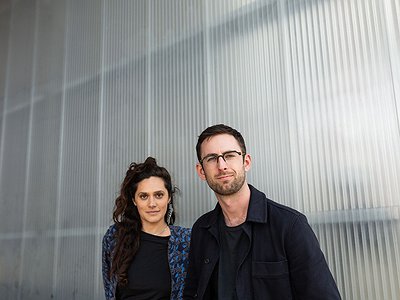How do you make use of technology? In terms of the feedback mechanism between technology and creativity, what do humans excel at, what do machines excel at?
A: Technology is a tool. It’s a tool we can make great use of, but as with all tools, it’s the work that you produce with them that is valuable, not the tool itself.
Production tools, from instruments to complex software environments, contribute to the compositional process. Can you describe the co-authorship between us and our tools?
A: I’m not sure I agree that production tools are co-authors in the way you have described. All of our tools, from AI programmes to deep learning systems, have still been guided or implemented by human hands. John Cage used dice to create what he called chance music, but I wouldn’t credit the dice as co-authors. Maybe tools are just tools.
What's your take on extra-musical concepts like presentations, discussions, art exhibitions and the like as an enrichment of your musical program?
R: We’re into it all! You can find inspiration from anywhere – within the team we’re often sharing bits of literature, visual arts, music and even textiles!
How is playing live and writing music in the studio connected? What do you achieve and draw from each experience personally? How do you see the relationship between improvisation and composition in this regard?
R: The act of improvisation and composition is sadly still far too separated from general instrumental playing. I believe that they can be far more connected than is currently the norm and personally I’m working to try and reconcile this within myself. Composition and improvisation are inextricably linked. The more we improvise the more possibilities emerge for imaginative playing within notated repertoire. Why are we afraid of this?!
There are many descriptions of the ideal state of mind for being creative. What is it like for you? What supports this ideal state of mind and what are distractions? Are there strategies to enter into this state more easily?
R: You know you’ve reached it when the hours pass by without you even noticing. Notifications are the enemy if you’re trying to achieve a focused state of mind – leave your phone in another place and still your mind. I’ve found recently doing a mindful activity can get me into a good zone. In the past this has ranged from practicing piano, yoga, flower arranging to removing the skins from chickpeas…(to make hummus, not just for its own sake!!)
A: Compartmentalising is really important for me. I find it difficult to really concentrate on more than one activity at a time, and often, I have to set time aside to focus on really deep work.
The role of the arts is always subject to change. What's your view on the (e.g. political/social/creative) tasks of the arts today and how do you try to meet these goals in your own work?
R: It’s important to us that everyone has access to the art we want to create. This itself can be a challenge as many of the ideologies are outdated, the values restrictive and in some circumstances, it’s just plain boring. This is not a surprise as much of the art form is historically rooted in the aristocracy of Western Europe, but that doesn’t mean it has to be now. We want to create an environment where people from all walks of life can feel comfortable and can experience something without feeling insecurity and prejudice.
Art can be a purpose in its own right, but it can also directly feed back into everyday life, take on a social and political role and lead to more engagement. Can you describe your approach to art and being an artist?
R: I find it an ever-changing discussion between head, heart and body. We have to let ourselves feel things in order to be able to be guided by this, but one cannot live life only on feelings so we have to manage this, in order to survive and thrive. I need a mixture of routine and chaos, deep questioning and no questions or judgements, silence and intense activity. My approach is all of these things, a constant juggling act of them all!
It is remarkable, in a way, that we have arrived in the 21st century with the basic concept of music still intact. Do you have a vision of music, an idea of what music could be beyond its current form?
R: Rather than looking ahead, I think it’s important that we never forget the value of live music and the simplicity with which this can be delivered. You don’t need huge productions to produce emotionally moving content. Yes, of course, it’s exciting to scale up but there is nothing more powerful than the raw, acoustic, human to human connection that can be made purely through a voice or a single instrument.


